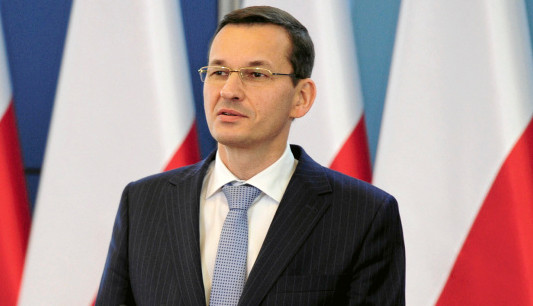Calling it ‘Polocaust’ doesn’t change the facts
I interviewed Mateusz Morawiecki, the prime minister of Poland, during his September visit to New York. The public-relations maven who arranged the meeting pitched Morawiecki — then still deputy prime minister — as a rising star anxious to allay concerns in the Jewish community about controversial legislation (which was signed into law on Feb. 6) regarding terminology and the Holocaust.
Indeed, when we sat down for our conversation, Morawiecki advanced the case that Jews and Poles have a common interest in commemorating the brutalities of the Nazi occupation together. Phrases like “Polish death camps” and “Polish concentration camps” (which the new law now considers a crime to actually use) should be excised from public vocabulary, he said, because they do a disservice to both Jews and Poles. (Nodding while taking notes, I told him that most Jews agree wholeheartedly with that complaint, and that it really wasn’t so controversial.) He wanted more understanding and more attention paid to the sufferings of the Polish nation during the war. (Again, I briefly interjected that this was also a goal that Jews could empathize with — just as we commemorate disabled victims of the ghastly eugenics program launched by the Nazis and gay men incarcerated in concentration camps, as well the 500,000 Romani gypsies exterminated on the grounds of their “racial impurity,” and so on.)
The way Morawiecki spoke, you would have thought that the Holocaust was an exclusively Jewish affair. But no credible Holocaust scholar has ever argued that the genocidal anti-Semitism that drove the Nazi conquest of Europe claimed only Jewish lives. As smooth and as polished as I found Morawiecki — who, like many of Eastern Europe’s more capable politicians, is well-traveled, speaks excellent English and, in his case, studied at Northwestern University outside Chicago — I left our encounter mildly disturbed by some of the questionable, even bizarre, claims that punctuated a message that was on the surface reasonable, even to the point of being unremarkable.
That unease has been borne out by the manner in which Poland has revised the Holocaust in the intervening time frame. The right-wing nationalists currently ruling Poland want to recast the Nazi extermination program as the “Polocaust,” a word coined this week by the country’s Deputy Culture Minister Jarosław Sellin when he urged the construction of a new museum dedicated to this topic.
In this rubric, talking about the suffering of ordinary Poles isn’t enough. The aim is to present the Holocaust as a largely Polish affair, with 6 million Polish victims, half of whom happened to be Jews but who are being reclaimed, in keeping with the Warsaw government’s present imperatives, as Poles first. Ironic really, given that many of the Poles who lived through the Nazi occupation — such as the pro-German Swietokrzyska Brigade, which fled westwards with the Nazis in 1945, and whose graves in Munich were visited by Marowiecki on Feb. 17 — would violently disagree with that assertion.
A good deal of the motive here is financial. Although Germany paid out more than $1 billion to Poland in wartime compensation in the mid-1990s, the country wants more, and its leaders hold up the reparations paid to Jewish communities as an example of how Jewish victimhood has been elevated above Polish victimhood. And while Morawiecki told me in September that he could foresee some of that money going to Jewish individuals and institutions, the way the legislation has been framed means that it’s virtually impossible for anyone who is not a Polish citizen to receive any future compensation.
On top of this comes a slew of myths and half-truths, all of which help to shape our understanding of the “Polocaust.”
One of the stranger assertions I heard from Marowiecki was that non-Jews who rescued Jews from the clutches of the Nazis elsewhere in occupied Europe were, if caught, subjected to a mere fine. But in Poland, he continued, saving Jews was a much riskier business because it brought a death sentence. This is dangerous nonsense, of course, and an insult to citizens in countries across Europe who were murdered because they were caught sheltering Jews. As sensitive and angry as Poland’s leaders are about their own wartime record, they have few qualms about belittling the contributions of others in those long, dark years of resistance to Hitler.
Ultimately, this is not a bad-tempered debate about history, but a concerted political campaign about the present. A number of Polish politicians, including a senior adviser to the president, have turned on Israel in the process, surmising that its policies toward the Palestinians are the result of the shame that Jews feel from having passively gone to the slaughter during World War II. Small wonder, then, that someone in Israel decided to daub the Polish embassy in Tel Aviv with obscenities, even if a more constructive response would have been to ask where, exactly, the Polish resistance was in April 1943, when the Jewish fighters of the Warsaw Ghetto rose in a heroic, bloody uprising against the far better-armed and more numerous Germans.
Only one other country today wields the Holocaust as a weapon to bash Israel and the Jews: Iran. That a member state of the European Union now finds itself in the company of Tehran’s deniers and revisionists should give pause. Yet European governments have looked the other way as Poland reinvents the Holocaust as the ”Polocaust,” conveniently deciding that this is one of those things that should be written off as an “internal matter.”
Of such platitudes are moral disasters borne.

 65.0°,
A Few Clouds
65.0°,
A Few Clouds 




